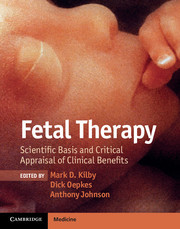Fetal Therapy Scientific Basis and Critical Appraisal of Clinical Benefits
Langue : Anglais
Coordonnateurs : Kilby Mark D., Johnson Anthony, Oepkes Dick

Fetal treatment, particularly complex fetal therapy, is an emergent and expanding field. This comprehensive text focuses on areas of fetal disease and pathophysiology that can be treated in utero and the benefits and problems with such therapy. Both medical (non-invasive) and surgical procedures are discussed, drawing on the expertise of an internationally renowned author team. Each chapter includes a comprehensive overview of the basic science underlying fetal pathology, as well as discussing the highest level of technical performance of fetal interventions. Contributions from fetal therapy 'centers-of-excellence' around the world collectively emphasize the need for an evidence-based approach to the field. This volume is useful both as a quick reference guide to the latest fetal therapy options and as an in-depth study book for maternal-fetal medicine and neonatology specialists at any stage of their career who are seeking to acquire essential background knowledge. Indispensable on any bookshelf in fetal medicine units.
Preface; Foreword; Part I. General Principles: 1. The rationale for fetal therapy; 2. Insights into pathogenesis of adult cardiovascular disease from fetal animal studies; 3. Human embryology: molecular mechanisms of embryonic disease; 4. Ethics of fetal therapy; 5. Fetal therapy choices: about risks, emotions, and the doctor's role in the decision making process; Part II. Fetal Disease: Pathogenesis and Principles: 6. Red cell alloimmunization: immunobiology, clinical disease, and management; 7. Fetal and neonatal alloimmune thrombocytopenia; 8.1. Fetal dysrhythmias: the effects of antiarrhythmic therapy on the immature heart; 8.2. Fetal dysrhythmias: clinical management; 9.1. Structural heart disease: embryology; 9.2. Structural heart disease: genetic influences; 9.3. Structural heart disease: fetal cardiac interventions; 10.1. Manipulation of amniotic fluid volume: homeostasis of fluid volumes in the amniotic cavity; 10.2. Manipulation of amniotic fluid volume: oligohydramnios and polyhydramnios; 11.1. Twin-to-twin transfusion syndrome: scientific basis; 11.2. Twin-to-twin transfusion syndrome: placental circulation; 11.3. Twin-to-twin transfusion syndrome: cardiovascular manifestations; 11.4. Twin-to-twin transfusion syndrome: treatment by fetoscopic laser ablation; 11.5. Twin-to-twin transfusion syndrome: management of stage I disease; 12.1. Twin reverse arterial perfusion (TRAP) sequence: pathophysiology; 12.2. Twin reverse arterial perfusion (TRAP) sequence: in-utero treatment; 13.1. Fetal infections: fetal immune responses to congenital infections; 13.2. Fetal infections: clinical management; 14.1. Fetal urinary tract obstruction: pathophysiology; 14.2. Fetal urinary tract obstruction: prenatal assessment and prognosis; 14.3. Fetal urinary tract obstruction: fetal cystoscopy; 14.4. Fetal urinary tract obstruction: in-utero intervention; 15.1. Fetal lung growth, development and lung fluid: physiology and pathophysiology; 15.2. Fetal lung growth, development, and lung fluid: clinical management of pleural effusion and pulmonary pathology; 16.1. Neural tube defects: pathophysiology and prevention; 16.2. Neural tube defects: clinical management; 17.1. Fetal tumors: pathophysiology; 17.2. Fetal tumors: clinical management; 18.1. Intrauterine growth restriction: placental basis and implications for clinical practice; 18.2. Intrauterine growth restriction: differential diagnosis and management; 19.1. Congenital diaphragmatic hernia: pathophysiology; 19.2. Congenital diaphragmatic hernia: clinical antenatal management; 20.1. Fetal stem cell transplantation: stem cell biology basics; 20.2. Fetal stem cell transplantation: clinical potential; 20.3. Fetal stem cell transplantation: fetal tissue engineering; 21. Gene therapy: physiological principles and clinical potential; 22. The future: fetal therapies and translation studies: global alignment, coordination and collaboration in perinatal research: The Global Obstetrics Network (GONet) initiative; Index.
Mark D. Kilby is Dame Hilda Lloyd Professor of Maternal and Fetal Medicine and Deputy Head of the School of Reproduction, Genes and Development, University of Birmingham, UK.
Anthony Johnson is Professor of Maternal Fetal Medicine, University of Texas Health Science Center, Houston, TX, USA.
Dick Oepkes is Professor of Obstetrics and Fetal Therapy, Leiden University Medical Centre, Leiden, The Netherlands.
Anthony Johnson is Professor of Maternal Fetal Medicine, University of Texas Health Science Center, Houston, TX, USA.
Dick Oepkes is Professor of Obstetrics and Fetal Therapy, Leiden University Medical Centre, Leiden, The Netherlands.
Date de parution : 12-2012
Ouvrage de 455 p.
22.5x28.2 cm
Disponible chez l'éditeur (délai d'approvisionnement : 14 jours).
Prix indicatif 223,14 €
Ajouter au panierThème de Fetal Therapy :
© 2024 LAVOISIER S.A.S.



